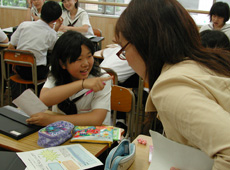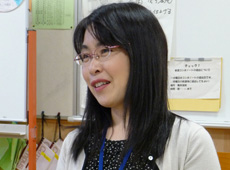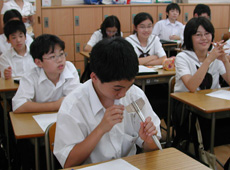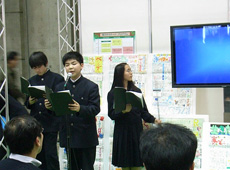Q. How do you want to deploy space education in the future?

A student poses a question to a lecturer from the Space Education Center.
At our school, space education has been part of the comprehensive study curriculum for the past three years. The children who started learning about space when they entered middle school three years ago will be promoted to high school this spring. In high school, students will conduct research on topics they select themselves, and will submit a thesis in their graduating year. I hope we can ask JAXA to advise and support students who choose space science for their research topics. I expect that what students choose to study in high school will influence to their future occupations.
Children's future can be changed by people they meet, what they talk about, and what kind of things they study in school. One tiny meeting or event can change a child's direction. It is up to children to decide if they want to follow a path when the opportunity is given to them, but it's the teacher's responsibility to give them such opportunities. I think the purpose of school education is to develop human potential, so in order to do that, I'd like children to experience as many things as possible.
Our dream as teachers is to see children realize their dreams - to succeed in what they want to do and become who they want to be in the future. I'll be so happy if in the future any child who participated in space education develops a new rocket. I would like to try these new educational approaches in order to create an environment where children can study with anticipation for the future and fulfill their dreams.
Q. What would you like to see the Space Education Center do in the future?

It seems like JAXA is collaborating with more schools every year, but on a nationwide scale the program is still rather small, so I hope JAXA gets more recognition for its efforts. For this reason, I would like to see JAXA release information more frequently, and I think it would be nice to have a website where teachers can blog, or do something similar to exchange information with each other.
There is a lot of information on JAXA's web site, but I cannot check it frequently when I'm loaded with daily work. As a result, I often find out about JAXA events after the fact. Also, JAXA's web site has many photos and images that are suitable for teaching materials, but I don't have enough time to select them, so sometimes I discover something too late and regret not having used it. I understand that we have to make an effort to acquire the data, but if information that we can use for teaching materials and notices of events could come to us automatically, I think it would be easier for schools to conduct space education. I think space education will spread nationwide through teachers sharing such information.
Courtesy: Kudan Secondary School, Chiyoda-ku
Head teacher at Kudan Secondary School in Chiyoda-ku
Ms. Yasukawa graduated from the Department of Chemistry, Faculty of Science, Kagoshima University. She first went to work in private-sector research in chemistry, and later became a teacher with the Tokyo Metropolitan Government. She has been a lecturer for JAXA's Cosmic College since 2007, and has taught an "experience space" class for elementary and middle-school students at the National Museum of Nature and Science, and at the Interesting Science Club sponsored by the Tokyo Electric Power Company.
Space School for a Bright Future for Children
Developing Children's Interest in Science
Helping create dreams of space

